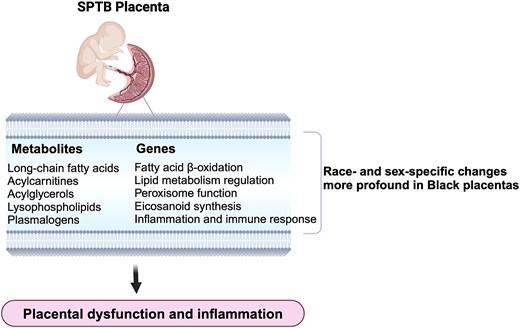-
Views
-
Cite
Cite
Yu-Chin Lien, Mengyuan Kan, Rita Leite, James P Garifallou, Blanca E Himes, Virginia D Winn, Samuel Parry, Jerome F Strauss III, Rebecca A Simmons, Race and sex differences in placental lipid metabolism are associated with spontaneous early preterm birth, Biology of Reproduction, 2025;, ioaf085, https://doi.org/10.1093/biolre/ioaf085
Close - Share Icon Share
Abstract
Placental dysfunction is implicated in the pathogenesis of spontaneous preterm birth (SPTB). We investigated race (self-identified maternal race) and fetal sex differences in the placental metabolome and transcriptome associated with early SPTB (<32 weeks). Long-chain polyunsaturated fatty acids, acylcarnitines, acylglycerols, plasmalogens, and lysophospholipids were remarkably different between SPTB and Term placentas. These alterations were much more profound in Black than in White SPTB placentas. Mode of delivery and body mass index (BMI) had no effect on these differences. The lipid metabolic pathways disrupted in early SPTB placentas also exhibited fetal sex differences, particularly between Black male and Black female placentas. The expression of genes involved in multiple lipid metabolism regulating pathways (e.g., PI3K/AKT signaling and phospholipase activity), especially eicosanoid synthesis and secretion, was significantly altered in early SPTB placentas. The race- and sex-specific changes in lipid metabolites and gene expression were consistent with inflammation in SPTB placentas, which was further supported by dysregulation of various inflammation and immune response pathways. These findings reveal race and fetal sex differences in lipid metabolism and inflammation in SPTB placentas and suggest greater dysfunction and inflammation in Black compared to White SPTB placentas, which may explain mechanisms underlying early SPTB and the risk of SPTB in different populations.





